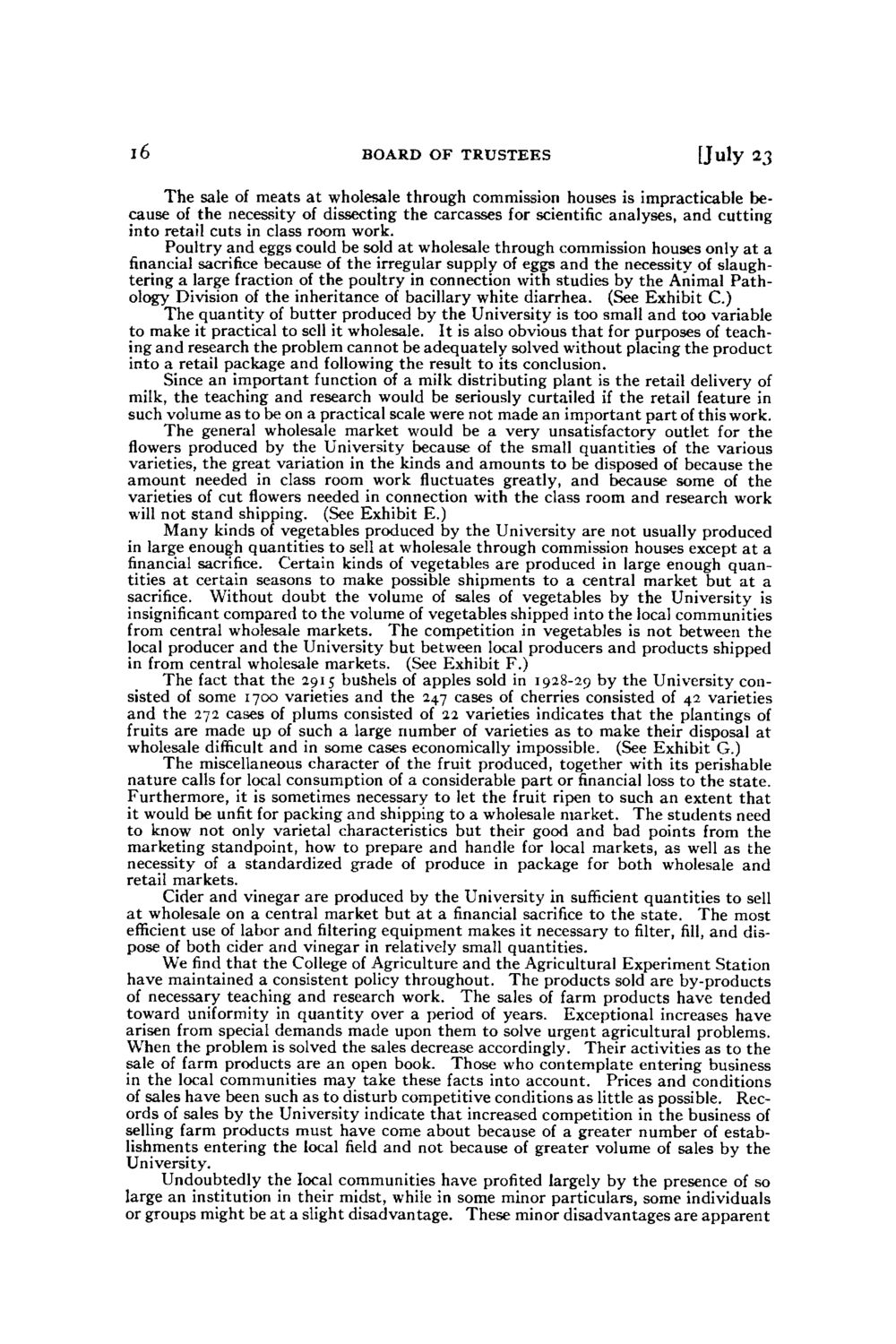| |
| |
Caption: Board of Trustees Minutes - 1932
This is a reduced-resolution page image for fast online browsing.

EXTRACTED TEXT FROM PAGE:
i6 BOARD OF TRUSTEES [July 23 The sale of meats at wholesale through commission houses is impracticable because of the necessity of dissecting the carcasses for scientific analyses, and cutting into retail cuts in class room work. Poultry and eggs could be sold at wholesale through commission houses only at a financial sacrifice because of the irregular supply of eggs and the necessity of slaughtering a large fraction of the poultry in connection with studies by the Animal Pathology Division of the inheritance of bacillary white diarrhea. (See Exhibit C.) The quantity of butter produced by the University is too small and too variable to make it practical to sell it wholesale. It is also obvious that for purposes of teaching and research the problem cannot be adequately solved without placing the product into a retail package and following the result to its conclusion. Since an important function of a milk distributing plant is the retail delivery of milk, the teaching and research would be seriously curtailed if the retail feature in such volume as to be on a practical scale were not made an important part of this work. The general wholesale market would be a very unsatisfactory outlet for the flowers produced by the University because of the small quantities of the various varieties, the great variation in the kinds and amounts to be disposed of because the amount needed in class room work fluctuates greatly, and because some of the varieties of cut flowers needed in connection with the class room and research work will not stand shipping. (See Exhibit E.) M a n y kinds of vegetables produced by the University are not usually produced in large enough quantities to sell at wholesale through commission houses except at a financial sacrifice. Certain kinds of vegetables are produced in large enough quantities at certain seasons to make possible shipments to a central market but at a sacrifice. Without doubt the volume of sales of vegetables by the University is insignificant compared to the volume of vegetables shipped into the local communities from central wholesale markets. The competition in vegetables is not between the local producer and the University but between local producers and products shipped in from central wholesale markets. (See Exhibit F.) The fact that the 2915 bushels of apples sold in 1928-29 by the University consisted of some 1700 varieties and the 247 cases of cherries consisted of 42 varieties and the 272 cases of plums consisted of 22 varieties indicates that the plantings of fruits are made up of such a large number of varieties as to m a k e their disposal at wholesale difficult and in some cases economically impossible. (See Exhibit G.) The miscellaneous character of the fruit produced, together with its perishable nature calls for local consumption of a considerable part orfinancialloss to the state. Furthermore, it is sometimes necessary to let the fruit ripen to such an extent that it would be unfit for packing and shipping to a wholesale market. The students need to know not only varietal characteristics but their good and bad points from the marketing standpoint, how to prepare and handle for local markets, as well as the necessity of a standardized grade of produce in package for both wholesale and retail markets. Cider and vinegar are produced by the University in sufficient quantities to sell at wholesale on a central market but at a financial sacrifice to the state. The most efficient use of labor and filtering equipment makes it necessary to filter, fill, and dispose of both cider and vinegar in relatively small quantities. W e find that the College of Agriculture and the Agricultural Experiment Station have maintained a consistent policy throughout. The products sold are by-products of necessary teaching and research work. The sales of farm products have tended toward uniformity in quantity over a period of years. Exceptional increases have arisen from special demands m a d e upon them to solve urgent agricultural problems. W h e n the problem is solved the sales decrease accordingly. Their activities as to the sale of farm products are an open book. Those w h o contemplate entering business in the local communities m a y take these facts into account. Prices and conditions of sales have been such as to disturb competitive conditions as little as possible. Recor groupsinstitution the slightfield and aboutincreased of disadvantages sales byofthe largeUndoubtedly at their have comenothave because competition in the individuals lishments might be the local midst, whilethat These minor a greatertheof are apparent selling farm productsamust communities inbecause of greater volumesome business so University. ords of sales by the in local disadvantage. some minor largely by number of estaban entering University indicate profited particulars, presence of
| |